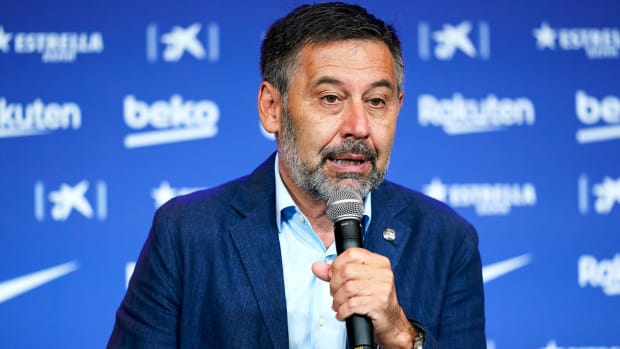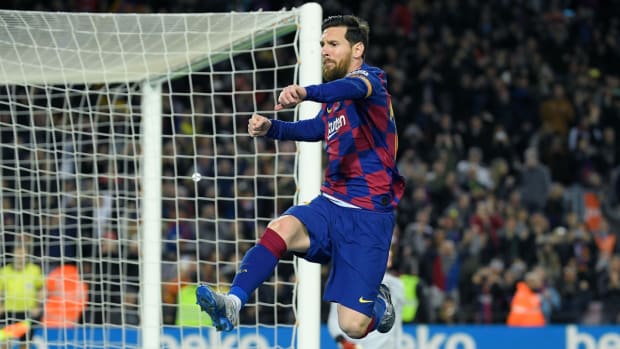In pointed comments after reversing course and announcing he'd be staying at Barcelona, Lionel Messi put all of his frustration on club president Josep Bartomeu.
Lionel Messi is not going to be leaving Barcelona this summer after all, but do not mistake that development for thinking that all is suddenly rosy at Camp Nou again.
Messi announced his decision to stay at the only club he's ever known as a professional on Friday in a revealing interview with Goal. The decision caps a remarkable couple of weeks, which began with Messi attempting to break up with Barcelona via burofax, only for contract terms (a 700 million euro/$835 million release clause) and technicalities (a free-exit clause that expired in June but came into dispute due to the postponement of the end of the season) preventing him from having a realistic way out a year before his agreement with the club expires.
In his reversal, Messi spoke about his love for the club, what the city–and potentially leaving it–would mean for his wife and young sons, and how he could never take the club that's given him so much to court to force his way out.
Messi isn't one to broadcast his thoughts regularly and publicly, so when he does, there's an added weight to them. And the bulk of the weight behind his most recent comments is directed fully at one man: Barcelona president Josep Maria Bartomeu.

Messi held no punches. He feels wronged and misled by Bartomeu. He blames Bartomeu for the club's multitude of problems. He might be staying, but he's not going to be fully happy about it.
“The management of the club led by Bartomeu is a disaster,” Messi said. "The truth is that there is no project at this club. They just plug holes as and when things happen. I would never go for a war against the club of my life. That's why I'm staying."
Objectively speaking, Messi is accurate. The club squandered the finances garnered from Neymar's 2017 world-record transfer to PSG, effectively turning him into Ousmane Dembele (the talented but oft-injured winger who has been repeatedly linked with an exit) and Philippe Coutinho (who scored twice against Barcelona on loan for Bayern Munich in the 8-2 Champions League thrashing that pushed Messi over the edge). Last summer's Antoine Griezmann signing really didn't make much sense from a tactical fit standpoint, and it was proven on the field, where the Frenchman was often anonymous or, even worse, supplanted by 17-year-old academy phenom Ansu Fati. That's over $400 million that was invested ineffectively all while the core of the squad aged considerably. Swings and misses happen in the transfer market, but Barcelona's approach didn't seem to be one with any discernible plan.
Beyond that, the club replaced manager Ernesto Valverde–he of the two straight La Liga titles–in the winter with Quique Setien, who was its third choice at best and lasted all of seven months. All this time, Barcelona was collapsing in the Champions League, with famous blown leads vs. Roma and Liverpool preceding the loss for the ages vs. Bayern in Lisbon. Messi has been called upon time after time to paper over the cracks in the foundation. It's understandable to see how his frustration would build as he reaches his mid-30s and the opportunities to win at the peak of his powers dwindle.
There does seem to be a new path being carved out for the younger players at the club, and new manager Ronald Koeman has already singled out the veterans he does not see coming along for the ride. By this point, though, Messi had already envisioned himself elsewhere, so he says.
Messi claims that he told Bartomeu all year long that he would be leaving, despite Bartomeu for months putting on a public face that all was copacetic. Not only would Messi not be leaving, the president said, but a new deal was on the table and he was confident that the Argentine icon would play out his remaining days on the Barcelona stage.
To hear Messi describe it from his perspective, that couldn't be further from the truth.
“I’m staying because the president said the only way to go was to pay the €700 million (release) clause, which is impossible. The other way was to go to court,” Messi said. “I wanted to go and I was totally within my rights, because the contract said I could leave for free. It wasn’t just: ‘I’m going.' It was very hard to go. I wanted to my final years of football to be happy and I didn’t find happiness at the club. There was nothing wrong with [me] going at that point. I needed it, the club needed it, it was good for everyone.
“The burofax was a way of making it official. I spent the whole year telling the president I wanted to go, that the moment had come to take a new direction. He told me all the time, ‘We’ll talk, but not now because of this or that.' He didn’t take on what I was saying to him."

It's possible that Bartomeu knowingly stalled to an effective degree. He has his own legacy to consider, and being the one who let Messi leave is likely not how he'd like to be remembered. Not that it really matters. If the results on the European stage and the ensuing frustrations from players and supporters didn't torch his reputation within the club, Messi certainly just did.
Club elections are set for March, at which time Bartomeu's reign will be over. Whether the club's relationship with Messi can be repaired in the coming months is now the next challenge. With his contract due to expire at the end of the 2020-2021 season, he can sign a pre-contract with any club of his choice in the winter before leaving for free. That doesn't leave much time for anyone–whether it's Bartomeu, other board members or presidential candidates–to convince him that signing a new deal at Barcelona is his best chance to secure those final happy years he desires.
This two-week transfer saga may be over, but the dramatic soap opera and power struggle at Barcelona will be continuing for the foreseeable future.